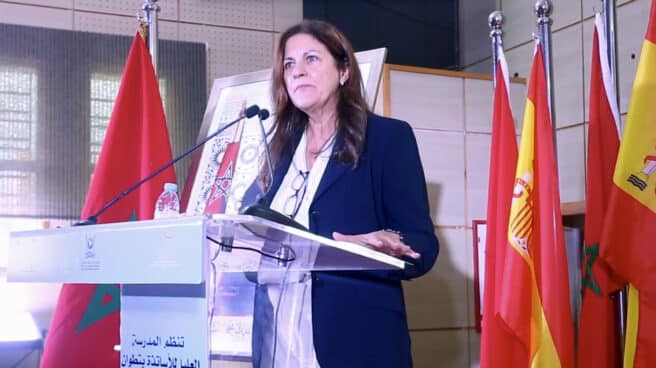

Maria Antonia Trujillo during this Friday’s conference in Tetouan.
Former Spanish minister Maria Antonia Trujillo broke weeks of silence following her controversial statements at the university in Tetouan demanding Spain’s resignation from Ceuta and Melilla by openly attacking the Spanish press, which she accuses of imposing a “uniform thought.” office.
“There is no freedom of speech in Spain when you separate yourself from the only official thought, as I said before,” says the socialist, who has been declared persona non grata in autonomous cities and lives in the Alaouite kingdom, in an interview published by Moroccan media. . “Obviously, freedom of speech and information is better protected in Morocco than in Spain. I would like Spain to take a cue from this country and not be subjected to such misinformation and manipulation,” he condemns.
Trujillo’s controversial statements again coincide with the publication of a Committee to Protect Journalists report condemning the ongoing harassment of Moroccan journalists trying to do their jobs and their families under constant surveillance Pegasus or the fabrication of legal charges with the ultimate goal of silencing them.
Data from international organizations refute the arguments of the former housing minister during the time of José Luis Rodríguez Zapatero in La Moncloa. According to the Reporters Without Borders World Press Freedom Index, Morocco ranks 136th out of 180 countries. The organization describes the situation of journalism in the territories of the former Spanish colony, occupied by Morocco since 1976, as an “information desert”.
informative hole
In a report published three years ago, “Western Sahara, a Desert for Journalism”, Reporters Without Borders denounced “the harassment and constant repression of Saharawi reporters who attempt to engage in alternative journalism outside of Moroccan officialdom, often subject to exorbitant prison terms.”
The news gag also applies to foreign journalists who are expelled almost immediately upon entering the territory. In addition to imprisonment or expulsion, professionals seeking to exercise their right to information are subject to arrest, slander, torture, ill-treatment or threats to their family environment. According to the organization, becoming a journalist in this part of the world is an “act of heroism”.
“I would be lying if I said that I did not expect such a reaction from the Spanish press to my positions. Even though Spain is considered one of the most developed democracies in the world, there is no protection in Spain from insults and slander against those of us who have performed public duties. There is no difference between private and public life, between the academy and the street,” lamented Trujillo, who lives in northern Morocco after leaving his position as education adviser at the Spanish embassy in Rabat amid complaints of inefficiency.
In an interview that repeats excerpts from a conference he gave in Tetouan, Trujillo reaffirms Morocco’s alleged sovereignty over Ceuta and Melilla during a week during which the Moroccan mission to the UN assured in a letter that the kingdom had no “land borders” with Spain. “[Lo de la persona non grata] It is nonsense that politicians compete for votes and it has nothing to do with the fundamental right that is freedom of movement. They also declared Manuel Fraga in Melilla and Santiago Abascal persona non grata. I don’t play in this division. I like scientific debate, reason, not meanness, ”he replies.
“For many years, Spain has forgotten the history, geography and DNA that binds us to Morocco,” he says after noting the Spanish government’s historic shift in stance on the Sahara conflict. And he adds, in case there is any doubt about his position: “The time has come [de abrir el dossier de Ceuta y Melilla]. You can no longer look away. To this day, Morocco claims these territories many times: in various forums, international and national, and by many participants. Going no further, especially last Thursday 13 October, Morocco’s letter to the UN Human Rights Council and the subsequent clarification of the land borders/crossing points of these cities reopened the debate in Spain. Question on the board.
Source: El Independiente